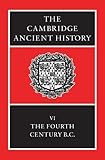The Cambridge Ancient History-VI The Fourth Century BC. Vol. 6 [electronic resource]
Material type: TextSeries: Cambridge Ancient History Ser ; Vol. 6Publication details: New York : Cambridge University Press Oct. 1994Edition: 2nd ed.,RevisedISBN:
TextSeries: Cambridge Ancient History Ser ; Vol. 6Publication details: New York : Cambridge University Press Oct. 1994Edition: 2nd ed.,RevisedISBN: - 9780521233484
- 0521233488 (Trade Cloth)
- 930 22
- D57
| Item type | Current library | Call number | Status | Date due | Barcode |
|---|---|---|---|---|---|
 Reference Books
Reference Books
|
CUTN Central Library Reference | 930 (Browse shelf(Opens below)) | Not for loan | 6664 |
License restrictions may limit access.
Annotation Volume VI of the new edition of The Cambridge Ancient History begins with Sparta attempting to consolidate its leadership of mainland Greece and ends with the death of Alexander the Great after he had conquered the Persian Empire and marched far into India. It is correspondingly wide-ranging in its treatment of the politics and economy, not only of old Greece, but of the Near East and the western Mediterranean. The century also saw the continued development of Classical Greek art and the moulding of Greek prose as an uniquely flexible means of expression. The formation of the great philosophical schools assured to Athens in her political decline a long future as a cultural centre, and established patterns of thought which dominated western civilization for two thousand years.
College Audience Cambridge University Press


There are no comments on this title.